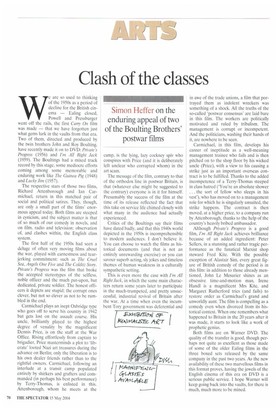Clash of the classes
Simon Heifer on the enduring appeal of two of the Boulting Brothers' postwar films
We are so used to thinking of the 1950s as a period of decline for the British cinema — Ealing closed, Powell and Pressburger went off the rails, the first Carry On film was made — that we have forgotten just what gems lurk in the vaults from that era. Two of them, directed and produced by the twin brothers John and Roy Boulting, have recently made it on to DVD: Private's Progress (1956) and I'm All Right Jack (1959). The Boultings had a mixed track record by this stage, some mediocre efforts coming among some memorable and enduring work like The Guinea Pig (1948) and Lucky Jim (1957).
The respective stars of those two films, Richard Attenborough and Ian Carmichael, return in this matched pair of social and political satires. They, though, are only a small part of the films' enormous appeal today. Both films are steeped in cynicism, and the subject matter is that of so much of our comedy in novels, and on film, radio and television: observation of, and clashes within, the English class system.
The first half of the 1950s had seen a deluge of often very moving films about the war, played with earnestness and tearjerking commitment: such as The Cruel Sea, Angels One Five and The Colditz Story. Private's Progress was the film that broke the accepted stereotypes of the selfless, noble officer and the much put-upon, but dedicated, private soldier. The honest officers it depicts are stupid; the corrupt ones clever, but not so clever as not to be rumbled in the end.
Carmichael plays an inept Oxbridge type who goes off to serve his country in 1942 but gets lost on the assault course. His uncle, brilliantly played to the highest degree of venality by the magnificent Dennis Price, is on the staff at the War Office. Rising effortlessly from captain to brigadier, Price masterminds a plot to 'liberate' looted Nazi art treasures during the advance on Berlin; only the liberation is to his own dealer friends rather than to the rightful owners. Carmichael, following an interlude at a transit camp populated entirely by shirkers and grafters and commanded (in perhaps his best performance) by Terry-Thomas, is enlisted in this. Attenborough, whom he meets at the camp, is the lying, lazy cockney spiv who conspires with Price (and it is deliberately left unclear who corrupted whom) in the art scam.
The message of the film, contrary to that of the orthodox line in postwar Britain, is that (whatever else might be suggested to the contrary) everyone is in it for himself. Presumably the success of the film at the time of its release reflected the fact that this take on service life chimed closely with what many in the audience had actually experienced.
Critics of the Boultings say their films have dated badly, and that this 1940s world depicted in the 1950s is incomprehensible to modern audiences. I don't believe it. You can choose to watch the films as historical documents (and that is not an entirely unrewarding exercise) or you can savour superb acting, sly jokes and timeless themes of human weakness in a culturally sympathetic setting.
This is even more the case with I'm All Right Jack, in which the same main characters return some years later to participate in the much-trumpeted, and pretty unsuccessful, industrial revival of Britain after the war. At a time when even the incumbent Tory government was deferential and in awe of the trade unions, a film that portrayed them as indolent wreckers was something of a shock. All the truths of the so-called 'postwar consensus' are laid bare in this film. The workers are politically motivated and ruled by tribalism. The management is corrupt or incompetent. And the politicians, washing their hands of it, are nowhere to be seen.
Carmichael, in this film, develops his career of ineptitude as a well-meaning management trainee who fails and is then pitched on to the shop floor by his wicked uncle (Price), with a view to his causing a strike just as an important overseas contract is to be fulfilled. Thanks to the added incompetence of a Terry-Thomas steeped in class hatred (`You're an absolute shower . . . the sort of fellow who sleeps in his vest'), who has moved on to a management role for which he is singularly unsuited, the strike happens. The contract is then moved, at a higher price, to a company run by Attenborough, thanks to the help of the country's heavily bribed ambassador.
Although Private's Progress is a good film, I'm All Right Jack achieves brilliance because of an added ingredient: Peter Sellers, in a stunning and rather tragic performance as the fanatical Marxist shop steward Fred Kite. With the possible exception of Alastair Sim, every great figure of British comedy of the period is in this film: in addition to those already mentioned, John Le Mesurier shines as an obsessive time-and-motion man, Irene Handl is a magnificent Mrs Kite, and Margaret Rutherford tries (and fails) to restore order as Carmichael's grand and unworldly aunt. The film is compelling as a comedy even when divorced from its historical context. When one remembers what happened to Britain in the 20 years after it was made, it starts to look like a work of prophetic genius.
Both films are on Warner DVD. The quality of the transfer is good, though perhaps not quite as excellent as those made of some of the older Ealing films in the three boxed sets released by the same company in the past two years. As the new availability of these two marvellous films in this format proves, having the jewels of the English cinema of this era on DVD is a serious public service. I hope Warner will keep going back into the vaults, for there is much, much more to be mined.


































































































 Previous page
Previous page